Portal for more climate-friendly mobility
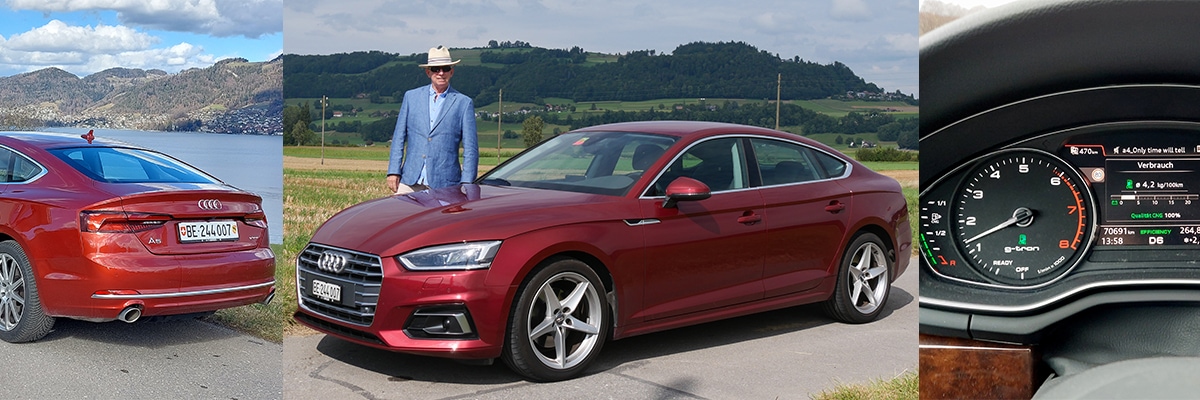
Biogas: an ingenious resource
Martin Minder, a business economist from Bern, currently sees only two climate-friendly types of drive: electric and CNG drive with biogas in the tank. Why?
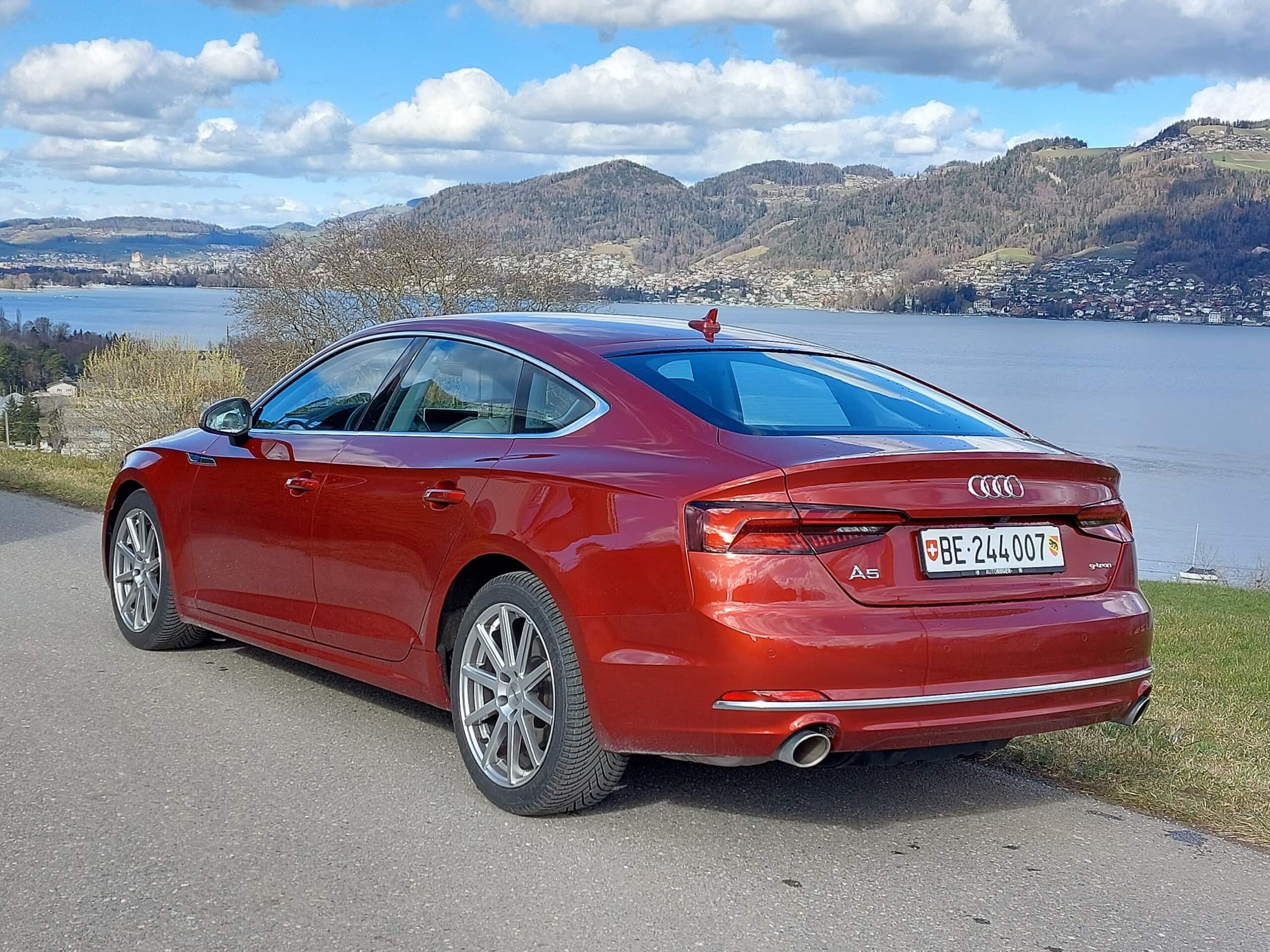 For the past year, business economist Martin Minder has been driving an Audi A5 Sportback powered by CNG, saving CO2 kilometer after kilometer thanks to biogas in the tank. Source: Martin Minder
For the past year, business economist Martin Minder has been driving an Audi A5 Sportback powered by CNG, saving CO2 kilometer after kilometer thanks to biogas in the tank. Source: Martin Minder
Mr. Minder, you switched to a Seat Leon with CNG drive in April 2019 and have been driving an Audi A5 g-tron for just over a year? How satisfied are you with the CNG vehicles?
Martin Minder, business economist and CNG driver from Leissigen BE: Since I bought the Seat Leon TGI in April 2019, I have been driving a car with a pure eco-conscience for the first time! The exhaust values are good, the engine noise is low and the most important thing: driving with biogas is climate neutral. A year ago I switched to the Audi A5 g-tron. I bought it as a second-hand model because its additional gasoline tank still holds 25 liters, which gives me an emergency range extension of 400 kilometers. The newer models have only a 7 liter small additional gasoline tank. The Audi is a fine touring car with good space and great power reserves, at the same time windy and economical. I get by on an average of 4.3 kg/100 km and almost never drive on gasoline in Switzerland.
Do you fill up with CNG or biogas as often as possible?
The answer to this question is clear: Only biogas whenever possible! And I only drive 3 to 4 percent of my kilometers on gasoline.
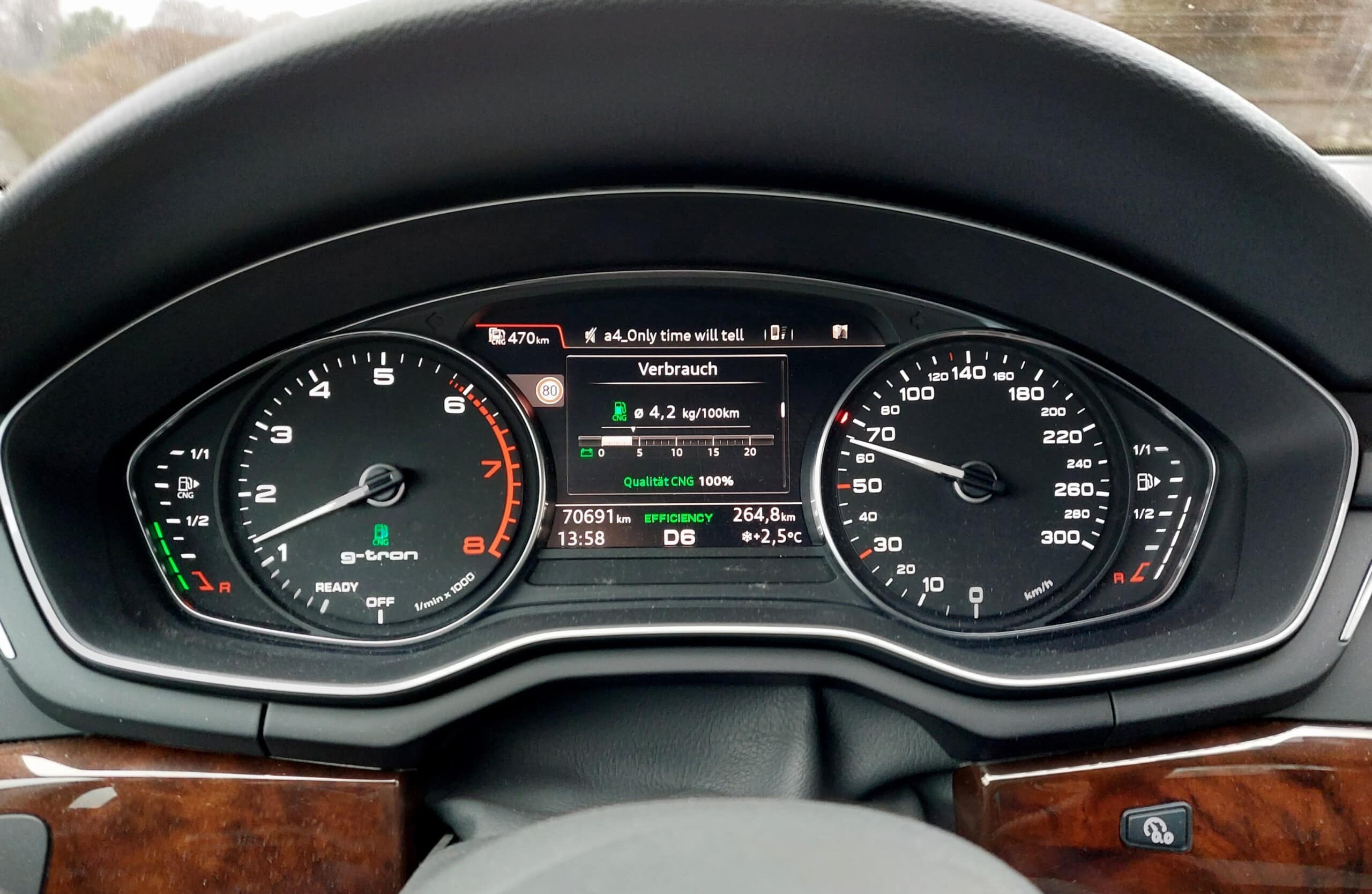 Martin Minder consumes an average of just 4.3 kg/100 km in the stately Audi and almost never drives on gasoline in Switzerland. Source: Martin Minder
Martin Minder consumes an average of just 4.3 kg/100 km in the stately Audi and almost never drives on gasoline in Switzerland. Source: Martin Minder
Why did you originally switch to a CNG-powered car?
A friend – who became a Seat Leon TGI driver shortly before me – pointed out to me that there are various biogas passenger cars and several filling stations in our region around Thun where you can fill up with 100 percent biogas. I was immediately hooked – future-oriented locomotion! As a scientifically minded person, I simply had to make the climate change for a few thousand francs. I was previously familiar with biogas vehicles in the form of Bernmobil buses, but private biogas driving was not at all on my radar.
Does it bother you that car manufacturers are focusing only on e-mobility and almost completely ignoring other technologies?
It bothers me extremely! Just last week Audi sent me an expensive brochure with mostly electric cars of the more expensive variety, but the brilliant range of g-tron cars was missing – I am appalled! The VW Group in particular was the largest supplier of CNG models in Europe. Audi had even specially set up its own biogas production facility and now they are apparently just letting this sensational technology «ride» – that’s beyond me.
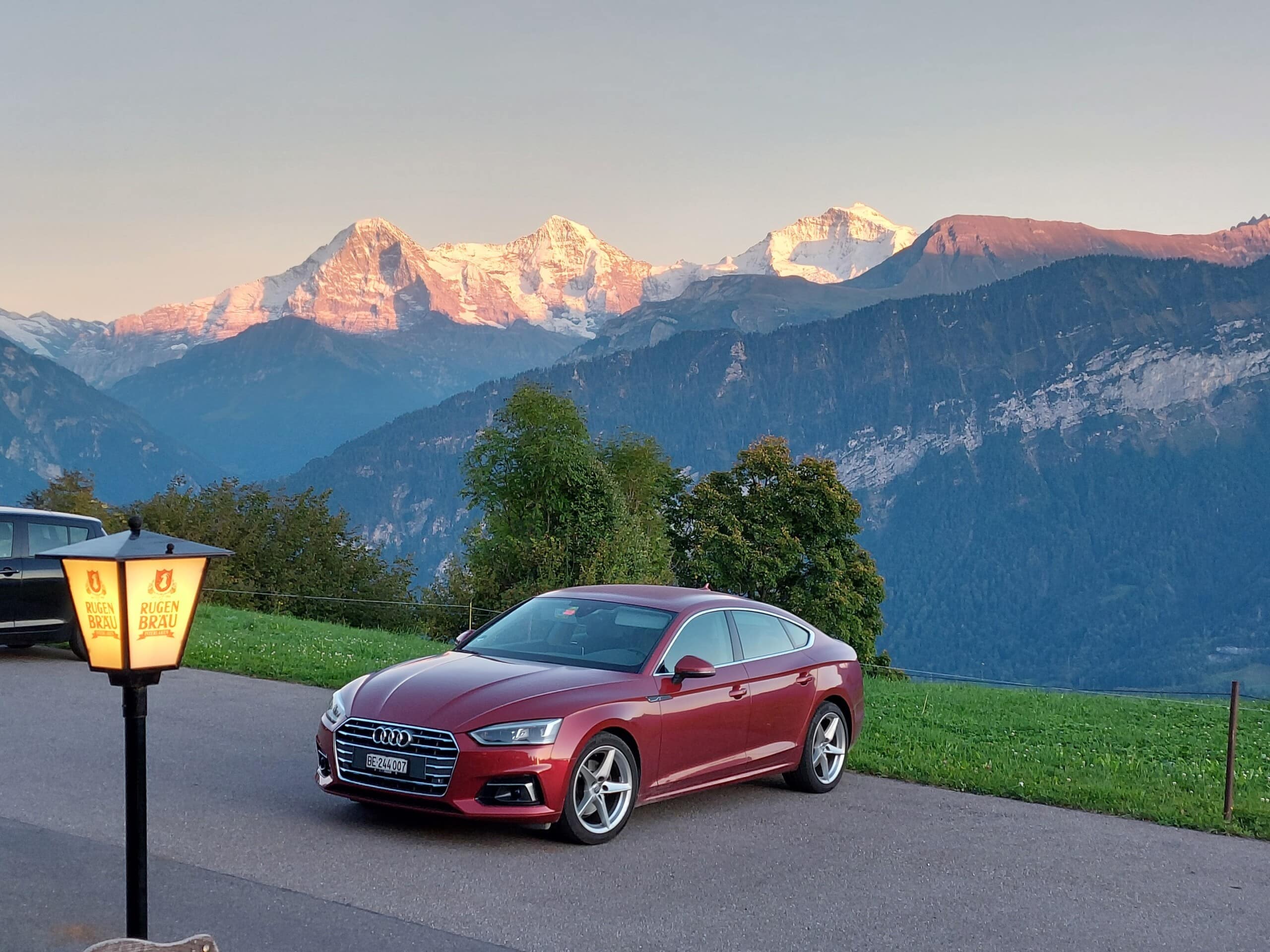 Source: Martin Minder
Source: Martin Minder
What bothers you most about this?
You have to know: Any organic matter that is passively microbially decaying generates methane. This escapes into the atmosphere and, as a greenhouse gas, is at least twenty times as harmful as CO2! Therefore, we would have to reverse the process: If we collect all the tons of organic waste in agriculture, trade, gastronomy and from households and build – this has to be promoted – as many biogas reactors as possible, we can use the methane as fuel. According to my observations, politicians know far too little about this. And the decision-makers in the business world are clearly still too little aligned with the scientific realities. At least major distributors in the Mittelland region have started to have vegetable and fruit residues collected from sales outlets and processed into climate-neutral energy in three large biogas plants, including one in Frutigen BE – very commendable.
How much CO2 have you already been able to save on all your kilometers thanks to CNG or biogas?
According to my calculations, the total savings in the years 2019 to 2021 will be 6.8 tons of CO2. In contrast, the 2000 or so kilometers I still drove with gasoline caused CO2 emissions of around 0.3 metric tons.
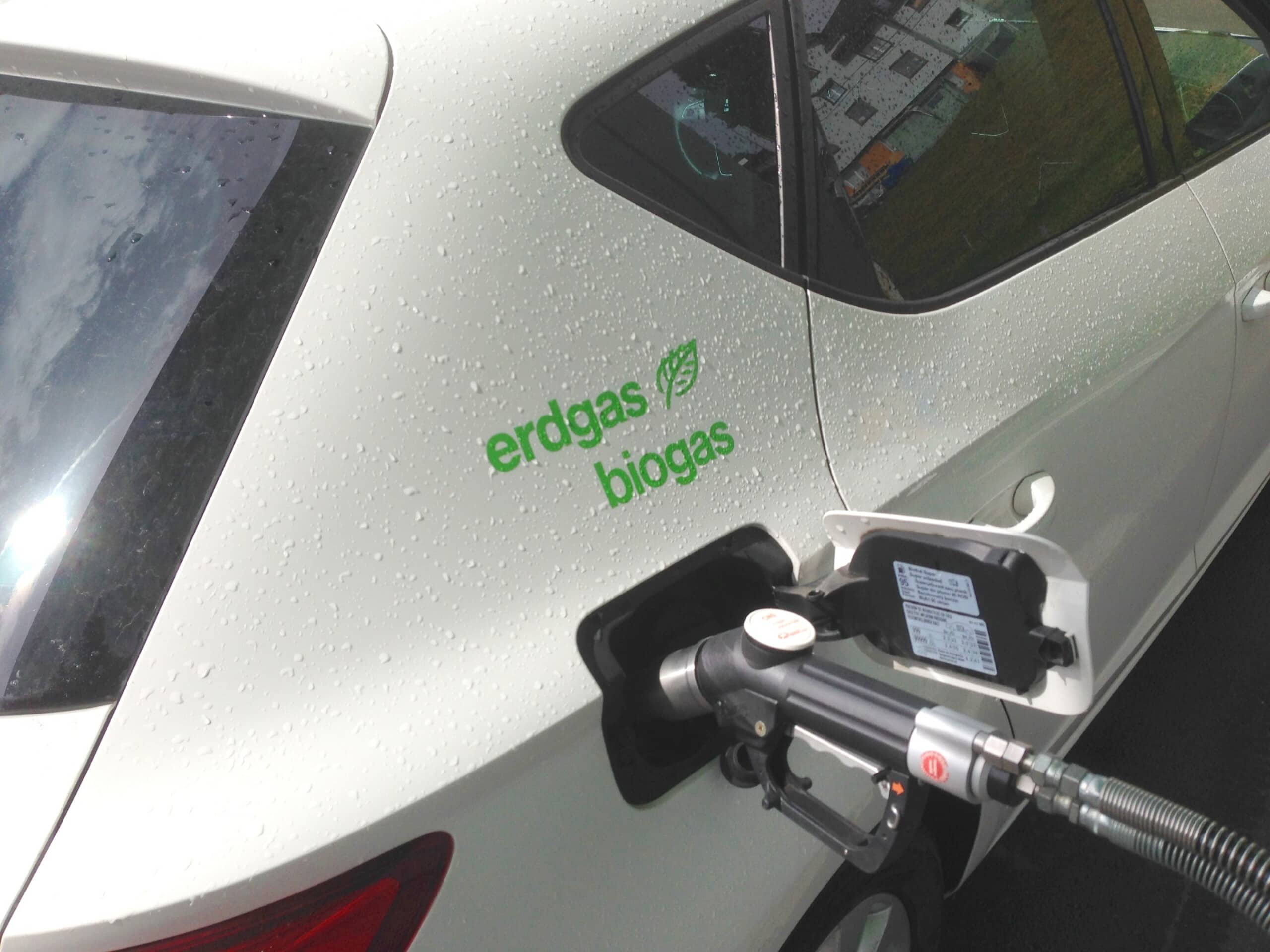 Even with his first CNG vehicle, a Seat Leon TGI, the man from Berne filled up with biogas whenever possible. Source: Martin Minder
Even with his first CNG vehicle, a Seat Leon TGI, the man from Berne filled up with biogas whenever possible. Source: Martin Minder
Are there also challenges as a biogas or CNG driver, for example in terms of the filling station network?
Yes, in Basel, Graubünden, Ticino and French-speaking Switzerland, I haven’t yet found any filling stations where you can get 100 percent biogas at the pump itself.
What advantages does CNG mobility offer you?
I know that I am doing something concrete for the planet, the climate and our future generations. And I’m doing so without sacrificing comfort, and even at around 20 percent lower fuel costs! Why is almost no one else doing this? Why are the experts in the Federal Department of the Environment, Transport, Energy and Communications (DETEC) and in the ministries of other countries so narrow-mindedly fixated on electric power? This is not goal-oriented.
Are there other advantages besides CO2 savings and low overall costs as a CNG user?
Yes, the avoidance of soot particle emissions and the lower noise of the CNG drive. After all, more than 35 percent of today’s cars are still diesel-powered…
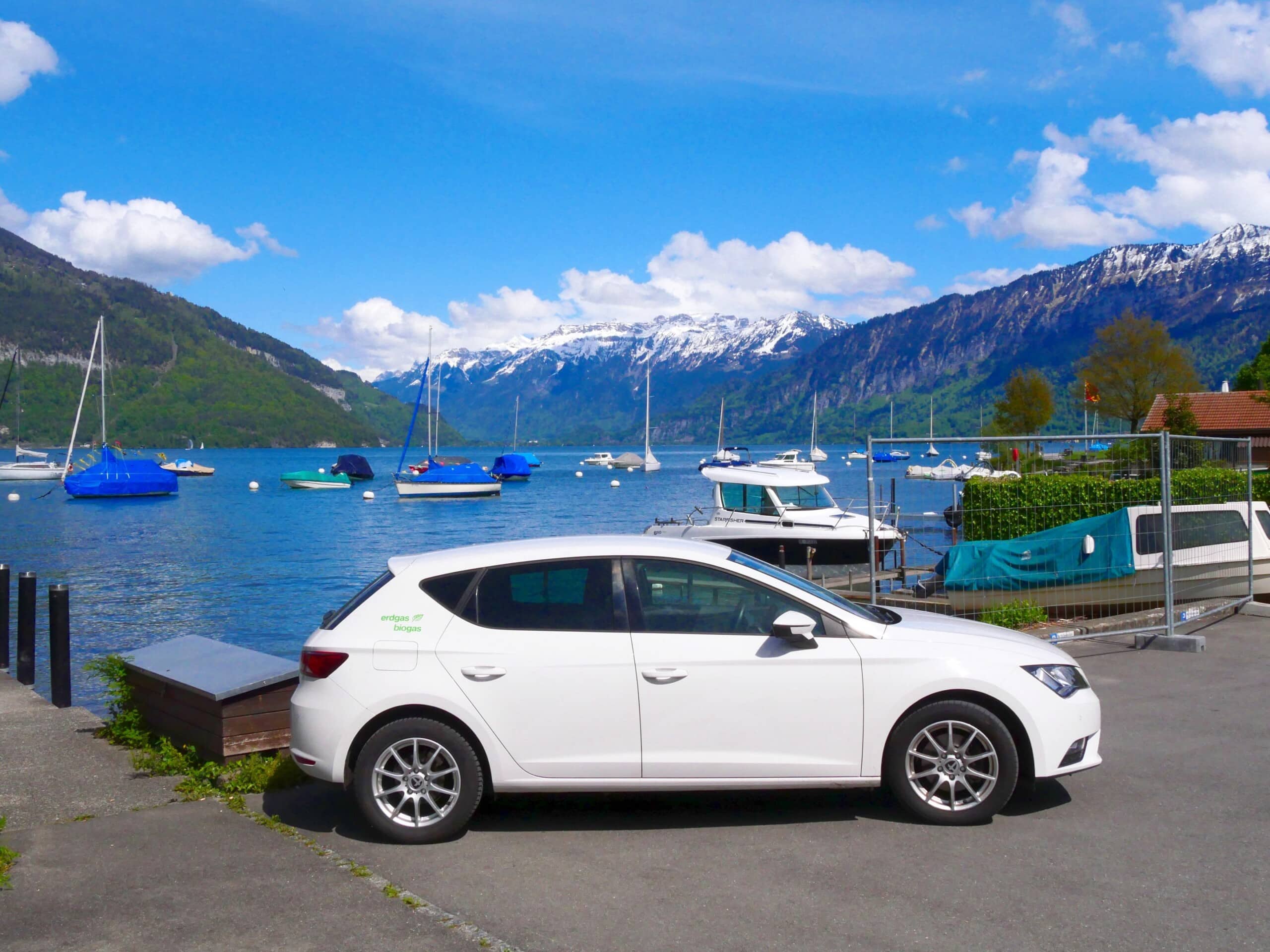 Martin Minder started his personal climate change with the Seat Leon TGI in April 2019 and has been an enthusiastic biogas driver ever since. Source: Martin Minder
Martin Minder started his personal climate change with the Seat Leon TGI in April 2019 and has been an enthusiastic biogas driver ever since. Source: Martin Minder
How do people around you react to your CNG car?
They listen to me and don’t really react! Even garage owners have zero enthusiasm for biogas vehicles, they are far too little green on average. They prefer to sell diesel SUVs with lots of horsepower, they bring more margin. Unfortunately, I know more about climate-friendly gas driving than many car salesmen.
How and why would you recommend a CNG car?
A car that runs on biogas clearly has the best carbon footprint over its lifetime, because its production requires much less energy and raw materials than an electric car! From kilometer 1, the CNG car can be operated in a climate-neutral manner. E-cars only run climate-neutral if they are filled with 100 percent clean electricity. I recommend that anyone I talk to about a new car purchase seriously consider the biogas option. Unfortunately, I cannot recommend a biogas vehicle to a person in the Jura or in Innertkirchen BE, because the next filling station is many kilometers away. I have therefore also given DETEC the urgent recommendation to make full use of Switzerland’s biogas potential by expanding production and distribution. If we had biogas filling stations in Adelboden, Grindelwald, Meiringen, Engelberg, Locarno, St. Moritz, etc. biogas filling stations, then the change to a more climate-friendly vehicle fleet would progress much faster. Something must also happen in agriculture. Here, too, there are already biogas tractors. (jas, May 19, 2022)
You might also be interested in
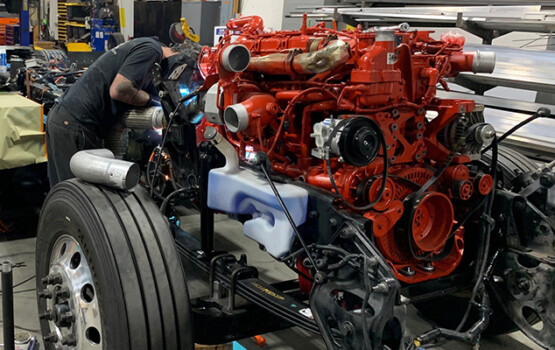
Operation on the open CNG heart
